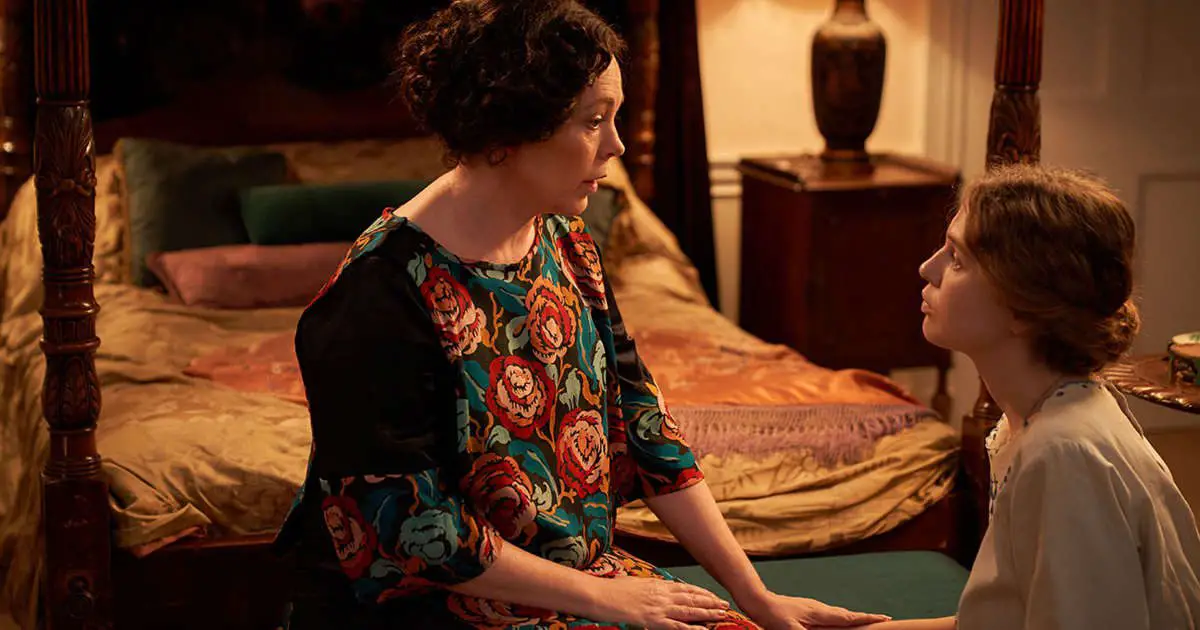Based on the novel by Grahame Swift, Mothering Sunday sports many of the tropes familiar both to the British Heritage drama and which one generally associates with mid-range prestige contemporary fiction: country houses, inter-class power play, generational conflict, an self-reflexive a-chronological narrative structure, themes of sexual and emotional repression and so on. By strange coincidence, both this and Old (which I also watched today) each left me with the impression that they would have been better suited to a different form, only to realise, upon the conclusion of my viewing, that both works were adaptations, and that they had originally existed in precisely the form I had felt would have suited them better than film. We’re used to seeing this kind of story on film, but Mothering Sunday adopts the kind of Atonement-y register reserved exclusively for adaptations of contemporary British literature set in the interwar years. It’s more televisual than Joe Wright’s films typically are, but it doesn’t feel undersized for the big screen, with director Eva Husson showing an affinity for the film’s intimate and dramatic moments.
The film follows Jane (Odessa Young) a young maid in service in a country house who is having a clandestine affair with the engaged son of their neighbours (Josh O’Connor), with the story told by her older self (Glenda Jackson) as she parses the story into a narrative, flashing back to the fateful Sunday when they met at his house for an illicit rendezvous. The film’s principal theme is just that; how one’s experiences inform their voice as a writer, and so themselves in later life. It’s perhaps the more tertiary themes that most bring the film alive, though.
Grief is a pervasive one, the local gentry having been lately decimated by the recent war, with every family mourning the loss of a son or two. Maybe it’s appropriate that the film was released in the UK in closer proximity to Remembrance Sunday than to Mother’s Day (called mothering Sunday in the UK). Having been a foundling, Jane has no mother of her own, with the film’s strongest parental presences being her employers the Nivens, played by Olivia Colman and Colin Firth. Predictably enough, in these roles Firth and Colman give the film’s standout performances as two people intimately familiar with grief and living with it in different ways. Firth is gentle, diplomatic and weary, having become an old hand at managing his and his wife’s moods, and no one plays brittle quite like Olivia Colman. The grief of losing her son is still raw and the society that raised her has left her totally unequipped to deal with such intense feeling, left to manifest only as hostility and heartache burning a hole in her stomach.

As the central lovers, the ever-reliable Young and O’Connor give solid performances. O’Connor projects a mixture of puckish arrogance and wounded naivety as young Paul, the black sheep of a family of whom he is now the sole male heir, and Young gives a thoughtful, ‘listening’ performance. The film makes extensive use of its leads’ naked bodies, not as devices for titillation but for thematic effect. There’s an incongruity between their nudity and their surroundings: the country house so iconographically associated with emotional repression and concealment. As the young maid moves through the chambers of the house, unfettered by the uniform denoting her class and station, her presence strikes a blow against the old traditional order shrinking from her, averting it’s eyes from her brazenness. With a generation of young men gone, space is created for a new generation of bohemian, working class intelligentsia to inhabit, as Jane takes up her employer’s old typewriter.
There’s another great performance from Emma D’Arcy as Paul’s intended. Clearly a spoiled brat yet still somewhat sympathetic, she’s just as bored and burdened with the expectations upon her as Paul is, not to mention the fact her childhood sweetheart has recently died, leaving her with his younger brother as a paltry consolation prize. She’s one of many characters here we feel somehow could’ve made the subjects of films of their own.
With the exception of Jane, every character in Mothering Sunday is bereaved, with her left a curious and critical observer of their suffering, that is, until she is pulled into it too. As the film enters its second half, it introduces an additional layer of narrative, focusing on Jane’s later relationship with Donald (Sope Dirisu) a loving and devoted partner who reopens the wounds left by her tragic past, encouraging her to devote herself to her writing. These scenes are engaging enough and manage to conjure a surprising emotional affect, but the story does seem to grow weaker the further afield it roams from the titular twenty-four hour period. This is evidenced by the frame narrative, in which the older Jane is congratulated for her dazzling growth as a writer. These scenes may be an important end point for her story, but they’re pretty clumsy and perfunctory, almost as if Glenda Jackson was impatient to get off home and would only give them an afternoon’s work.
Sub-Brideshead material it may be, but Mothering Sunday does manage to explore similar territory with sufficient interest and perspicacity to warrant attention. It does feature some moving dramatic moments, some deeper thematic waters to enjoy drifting through and an intriguingly convoluted time frame that peels the film’s story back in an engagingly literary fashion. It’s not a remarkable feature by any means, but a moderately compelling one throughout, and an opportunity for it’s excellent cast to demonstrate their carrying abilities.



